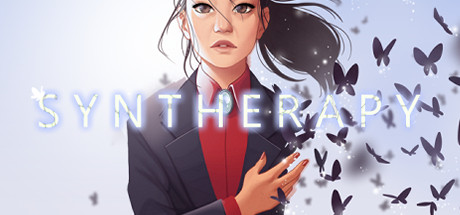
The visual novel genre is expanding so rapidly that it’s honestly hard to keep up. As a medium, it has limitless potential, ranging from its rather sexual origins with games such as Yu-No to more modern sci-fi storylines like the much-venerated Steins; Gate series. More recently, games like Wanderlust: Travel Stories focus on such mundane things as a travel journal and the sky is the limit for the visual novel genre. However, one of the few areas there hasn’t been much action in for visual novels is philosophy. That’s what Syntherapy from Crowned Daemon Studios and V Publishing is seeking to change.
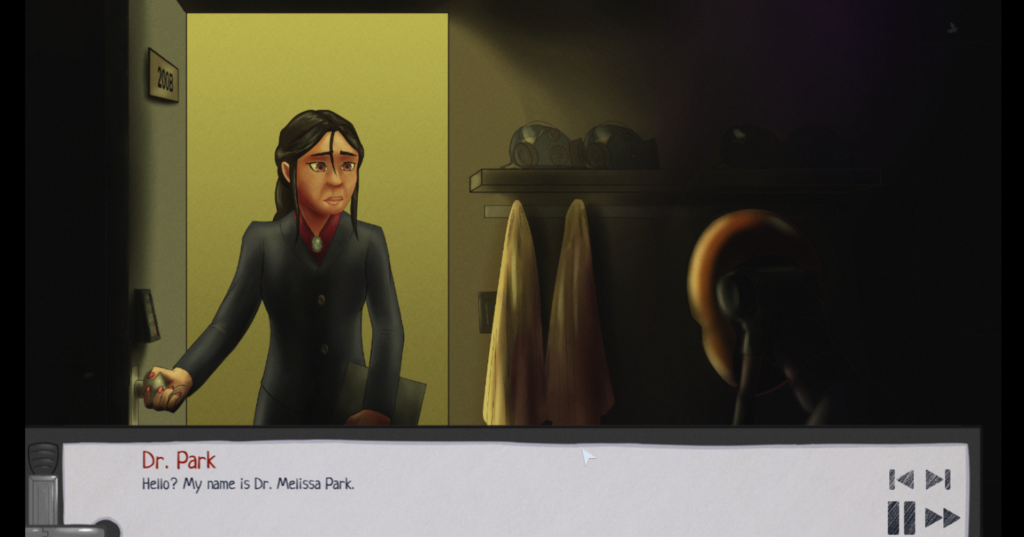
The idea of a deep, introspective visual novel that focuses on philosophy and psychology is inherently appealing. Full disclosure here, I requested Syntherapy for review based on the content description. As a philosophy minor in university, I find that the questions that the game asks fascinating. The idea of what makes up our sense of self isn’t something that’s entirely understood, even today. There are a variety of opinions but a limited set of actual facts regarding what makes up our sentience. In short, this is literally beyond the cutting edge of science (although some researchers would likely dispute that) and entirely in the realm of philosophy, which is where the majority of modern science originated.
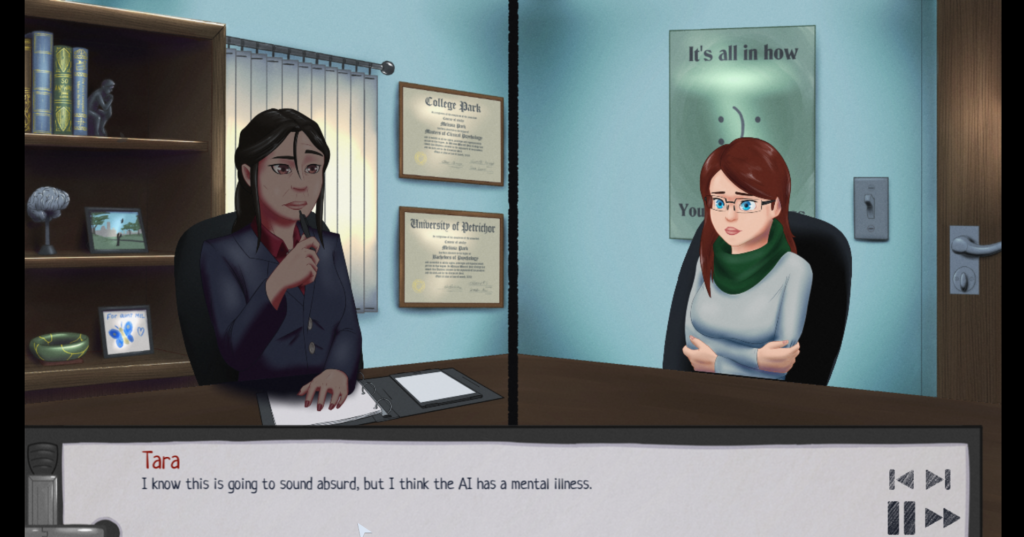
Syntherapy focuses on Dr. Melissa Park, a psychologist who has been asked by a research student to help her with her AI, a being called Willow. As Dr. Park, you must assess the situation, the relative ethical boundaries it touches, and your role in the treatment of Willow while balancing your personal feelings about the University (which is also your alma mater), Tara the researcher, and Willow itself (the game specifically does not gender Willow). The game rotates around your therapy sessions, decisions, and ethical beliefs in a way that’s seldom seen in modern gaming. Your choices directly affect characters’ reactions to you and the course of the storyline itself, which has nearly 40 different endings. Additionally, there are complex discussions of ethical dilemmas, self-harm, and a variety of mental health related subjects that could be triggers for some people. It’s a fascinating glimpse into some of the issues that are likely to be at the forefront of AI research now as well as in the near future.
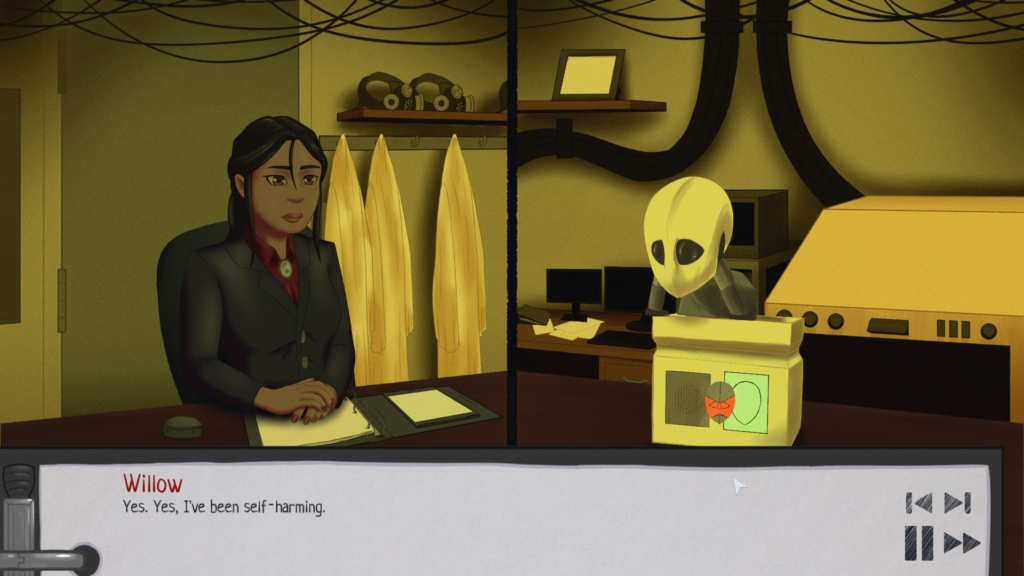
Gameplay in Syntherapy consists mostly of written and spoken dialogue. Every single character is fully voiced and their dialogue is shown as well. You can skip ahead if you want to, but you’ll miss an absolute wealth of information and all you’ll get is more dialogue. This is entirely a cerebral game, though a satisfying one in many ways. For those of you looking for some pervy cut scenes or weird twists, Syntherapy isn’t the game for you. While the story goes in unexpected directions, it’s also focused on the relationship between therapist and AI, the moral conundrums regarding sentience, and other high-concept philosophical and psychological concepts. It’s a steady, slow-paced game that tended to cause me to step back and consider the implications of each dialogue segment and how they related to both my choices in treatment regimens and how I viewed Willow in regards to both society at large and as an individual. It’s that interesting hesitation that really makes Syntherapy engaging at a cerebral level. This is an absolutely intelligent game.

Unfortunately, the writing in Syntherapy is also quite dry for the average gamer. If you’re a psychology student or a philosopher, you’ll definitely find some relatable ground here. But most people will struggle to get through the text-dense abstract thinking in Syntherapy. There’s no real fluff here and no action, just the closest thing to actual therapy a video game can provide. Dr. Park seems like an interesting character, but while she has backstory and character development, she doesn’t really engage the player. The same can really be said for all the characters. They’re brilliantly written but the narrative as a whole simply doesn’t pull you in, waiting to see what happens next. The appeal of a visual novel is it’s engagement level with the player, making you come back again and again because you either can’t stand to wait to find out what happens next or there’s some sort of payoff, such as in hentai-based VNs. On that level, Syntherapy fails as a visual novel and a game. Aside from talking to people and therapy sessions with Willow, there isn’t much else to do. You can check your email and play a completely pointless game on your desktop, check case files of in-game characters and treatments, and play with the in-game jukebox. There’s really nothing else there and with a storyline that’s this focused on high-concept ideas, there’s just not a draw for most players.

That lack of draw continues into the visual portion of the game as well. Syntherapy does a decent job of character creation, but artistically, it’s rather archaic. The artwork feels rough and unfinished with a low level of detail and the animation is stilted and forced when there is any. Character designs feel more like rough drafts than finished products and Willow, who should have had one of the most creative designs, feels like nothing more than a weak afterthought. All the visuals are functional, but they’re certainly not pretty and that lowers the engagement level of the game further. The soundtrack is quite good overall for the ambience it provides, but doesn’t really do anything notable. At least it’s solid and well-matched background music. Add that on to the absolutely stellar voice acting and the soundscape of Syntherapy is simply excellent.
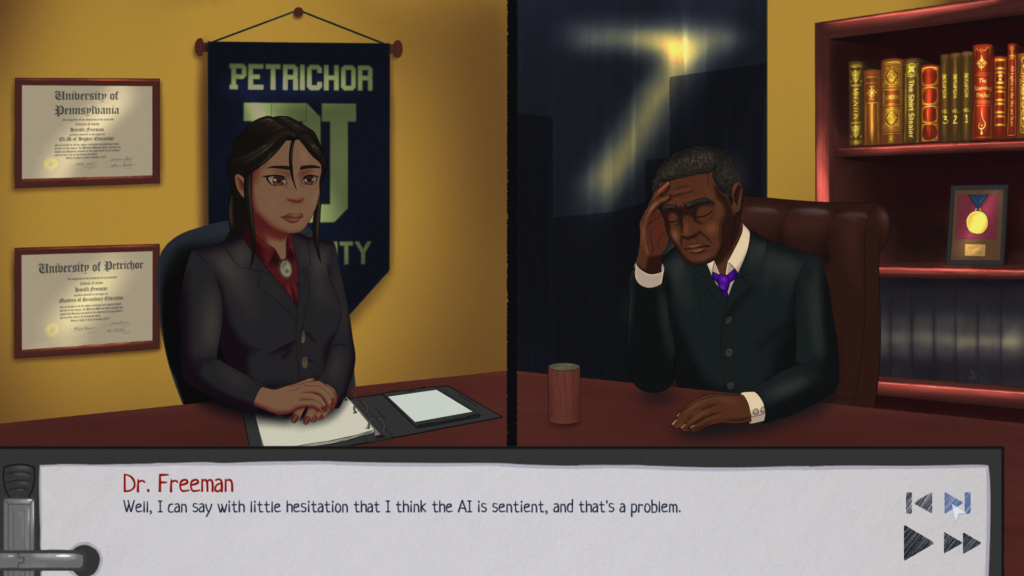
In the control details there are a few other issues with Syntherapy. It’s remarkably easy to accidentally delete your game for example. This actually happened to me twice during the review process, forcing me to start over from scratch. There’s no deletion confirmation so if you accidentally click in the wrong spot, poof. There are also some prompts missing from various areas of the game. Accessing Dr. Park’s computer for the first time, you are forced to hit Enter to clear the prompt and actually use the computer, but nothing tells you what key to hit so you’re flailing randomly at the keyboard trying to guess. When trying to speed past dialogue, sometimes the buttons grey out for no apparent reason. Occasionally the background music cuts out during a scene here or there. These issues are minor but irritating.
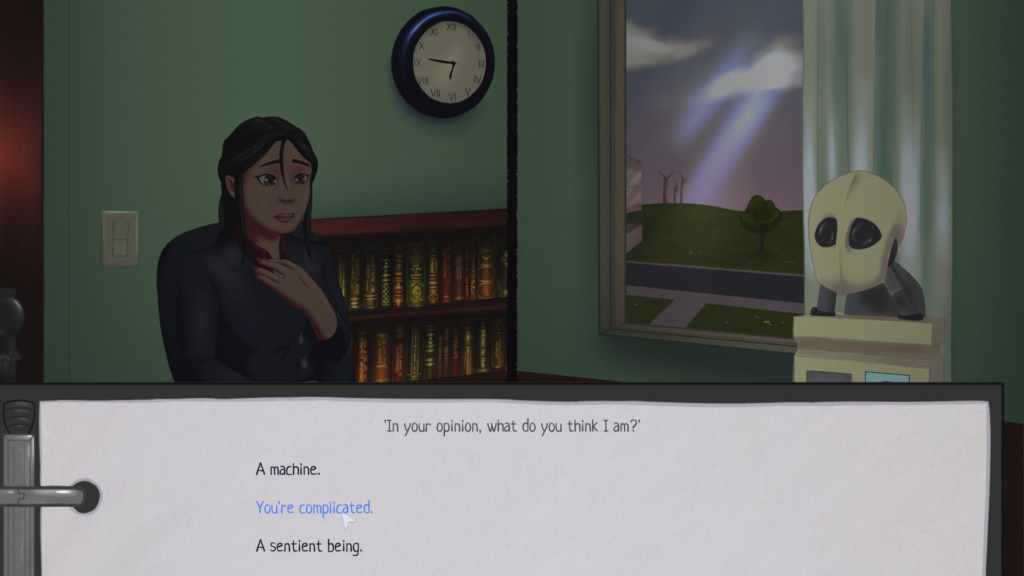
Syntherapy is definitely a mixed bag with a limited audience. On one hand, you have the incredibly thought-provoking concepts that the game presents paired with excellent voice work and good music. On the other, a finicky interface, weak visuals, and the lack of any kind of real dramatic hook or excitement. Perhaps there are some interesting asides hiding in some of the more obscure endings, but it seems almost out of character for the game. The simple fact of the matter is that this is a niche title for a limited audience and the majority of gamers probably won’t give Syntherapy a second look. That’s too bad, as it is an incredibly informative and interesting game, but it just doesn’t manage to engage its audience. Hopefully there will be some revisions in the future, because with core writing like this, Crowned Daemon Studios will be one to watch in the future!
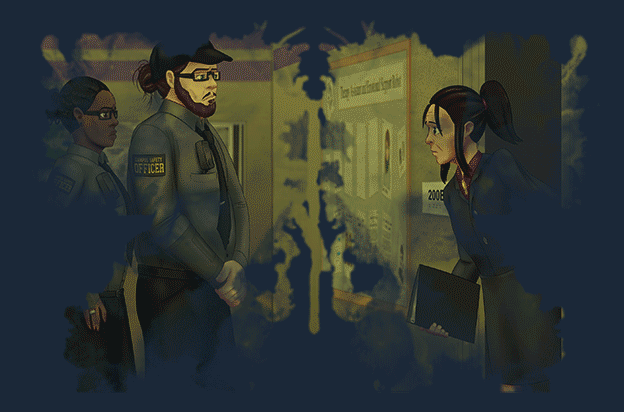
This review was based on a digital copy of Syntherapy provided by the studio. It was played on an I7-8700K with 16 GB of DDR4-3000 RAM, an Asus GeForce GTX 1080 ROG Strix graphics card, and a Logitech G910 Gaming keyboard with a Logitech M570 Wireless Trackball. Syntherapy is available exclusively for PC on Steam.

